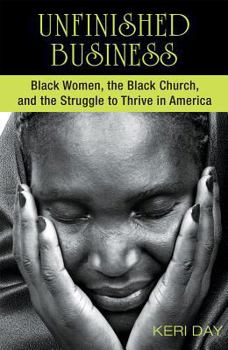Unfinished Business: Black Women, the Black Church, and the Struggle to Thrive in America
This striking portrayal of the poverty of black women in this country describes the unemployment, underemployment, isolation, and lack of assets they typically experience. Day also takes on and demolishes the common stereotypes that castigate poor black women as "morally problematic and dependent on the money of good tax-paying citizens."
Day then calls on the black churches to become potential agents of change and leaders in addressing the unequal social and economic structures that hold captive these poor women. The goal is to empower poor black women to develop assets that will prevent long-term poverty and allow them to flourish.
Format:Paperback
Language:English
ISBN:1570759812
ISBN13:9781570759819
Release Date:September 2012
Publisher:Orbis Books
Length:180 Pages
Weight:0.62 lbs.
Dimensions:0.4" x 6.0" x 9.3"
Customer Reviews
0 rating





